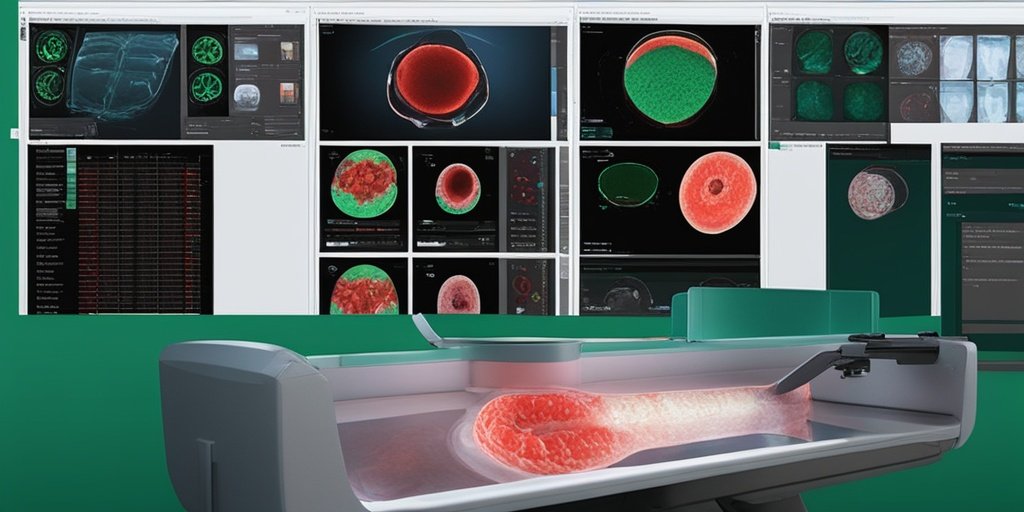⚡ Quick Summary
This study developed a deep learning-based classifier to detect mismatch repair deficiency in colorectal cancer using routine colonoscopy images. The model achieved an impressive AUROC of 0.948 on the test dataset, indicating its potential as an automatic screening tool for this critical biomarker.
🔍 Key Details
- 📊 Dataset: 5,226 colonoscopy images from 892 tumors
- 🧩 Features used: Routine colonoscopy images
- ⚙️ Technology: Deep learning classifiers
- 🏆 Performance: AUROC of 0.948 on test dataset, 0.807 on independent validation dataset
- 🔍 NPV: 94.2% on independent validation dataset
🔑 Key Takeaways
- 📊 Mismatch repair deficiency is a key biomarker for colorectal cancer treatment.
- 💡 Deep learning can enhance the detection of this deficiency from colonoscopy images.
- 👩🔬 The study utilized images from a large dataset of colorectal cancer patients.
- 🏆 The model demonstrated high accuracy with an AUROC of 0.948.
- 🤖 The model identified 87.88% of deficient tumors in a prospective trial.
- 🌍 This technology could streamline the screening process for colorectal cancer.
- 🆔 Clinical relevance is significant, given the potential for improved patient outcomes.

📚 Background
Mismatch repair deficiency or microsatellite instability is a crucial predictive biomarker for the effectiveness of immune checkpoint inhibitors in treating colorectal cancer. Despite its importance, routine testing for this biomarker has not been consistently implemented due to various cost and resource constraints. This study aims to bridge that gap by leveraging advanced technologies.
🗒️ Study
Conducted at the Endoscopic Center of the Sixth Affiliated Hospital, Sun Yat-sen University, this study focused on developing a deep learning model to detect mismatch repair-deficient status from colonoscopy images. The researchers utilized a comprehensive dataset from a prospective trial involving neoadjuvant PD-1 blockade therapy in patients with locally advanced colorectal cancer.
📈 Results
The deep learning model was trained on a total of 5,226 images and achieved an AUROC of 0.948 on the test dataset, indicating excellent performance. In the independent validation dataset, the model maintained a respectable AUROC of 0.807 and a negative predictive value (NPV) of 94.2%. Notably, in the prospective trial dataset, the model successfully identified 29 out of 33 deficient tumors, translating to an accuracy of 87.88%.
🌍 Impact and Implications
The implications of this study are profound. By integrating deep learning technology into routine colonoscopy practices, we could significantly enhance the early detection of mismatch repair deficiency in colorectal cancer. This advancement could lead to more personalized treatment options and improved patient outcomes, ultimately transforming the landscape of colorectal cancer management.
🔮 Conclusion
This study highlights the remarkable potential of deep learning in the realm of colorectal cancer diagnostics. With a high NPV and accuracy in detecting mismatch repair deficiency, this model could serve as a valuable automatic screening tool. Continued research and development in this area could pave the way for more efficient and effective cancer care strategies.
💬 Your comments
What are your thoughts on the use of deep learning in cancer diagnostics? We would love to hear your insights! 💬 Share your comments below or connect with us on social media:
Deep learning-assisted colonoscopy images for prediction of mismatch repair deficiency in colorectal cancer.
Abstract
BACKGROUND: Deficient mismatch repair or microsatellite instability is a major predictive biomarker for the efficacy of immune checkpoint inhibitors of colorectal cancer. However, routine testing has not been uniformly implemented due to cost and resource constraints.
METHODS: We developed and validated a deep learning-based classifiers to detect mismatch repair-deficient status from routine colonoscopy images. We obtained the colonoscopy images from the imaging database at Endoscopic Center of the Sixth Affiliated Hospital, Sun Yat-sen University. Colonoscopy images from a prospective trial (Neoadjuvant PD-1 blockade by toripalimab with or without celecoxib in mismatch repair-deficient or microsatellite instability-high locally advanced colorectal cancer) were used to test the model.
RESULTS: A total of 5226 eligible images from 892 tumors from the consecutive patients were utilized to develop and validate the deep learning model. 2105 colorectal cancer images from 306 tumors were randomly selected to form model development dataset with a class-balanced approach. 3121 images of 488 proficient mismatch repair tumors and 98 deficient mismatch repair tumors were used to form the independent dataset. The model achieved an AUROC of 0.948 (95% CI 0.919-0.977) on the test dataset. On the independent validation dataset, the AUROC was 0.807 (0.760-0.854), and the NPV in was 94.2% (95% CI 0.918-0.967). On the prospective trial dataset, the model identified 29 tumors among the 33 deficient mismatch repair tumors (87.88%).
CONCLUSIONS: The model achieved a high NPV in detecting deficient mismatch repair colorectal cancers. This model might serve as an automatic screening tool.
Author: [‘Cai Y’, ‘Chen X’, ‘Chen J’, ‘Liao J’, ‘Han M’, ‘Lin D’, ‘Hong X’, ‘Hu H’, ‘Hu J’]
Journal: Surg Endosc
Citation: Cai Y, et al. Deep learning-assisted colonoscopy images for prediction of mismatch repair deficiency in colorectal cancer. Deep learning-assisted colonoscopy images for prediction of mismatch repair deficiency in colorectal cancer. 2024; (unknown volume):(unknown pages). doi: 10.1007/s00464-024-11426-1